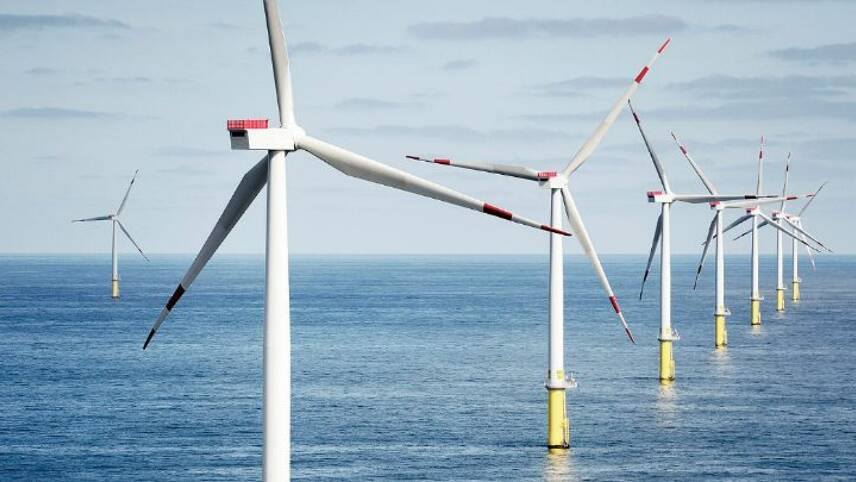Register for free and continue reading
Join our growing army of changemakers and get unlimited access to our premium content

Wind alone accounted for 18% of Britain's electricity mix between January and May. Image: Ørsted's Walney wind farm
Published today (21 June), the data reveals that clean energy sources – wind, solar, nuclear and hydropower – generated 47.9% of Britain’s electricity between January and May, compared to 46.7% for coal and gas-fired sources.
National Grid predicts that this trend will continue until the end of 2019 and that the latter half of the year is likely to see renewables take an even bigger share of the electricity mix, partly due to new North Sea Link’s upcoming connection to Norway’s hydropower network. Moreover, next year will see one of the UK’s six remaining coal power stations, SSE’s Fiddler’s Ferry in Cheshire, decommissioned.
The news comes shortly after the operating firm for National Grid, National Grid Electricity System Operator (ESO), celebrated the UK’s first fortnight of coal-free electricity generation since pre-industrial times. In total, more than 650 coal-free hours were recorded between January and March 2019, with a further 100+ clocked up during May.
According to National Grid’s chief executive John Pettigrew, the firm’s next big challenge will be implementing measures now to reach net-zero “as quickly as possible”. National Grid ESO first announced plans to run a zero-carbon network for the UK by 2025 – excluding Northern Ireland – in April, ahead of the Government’s newly unveiled plans for total decarbonisation by 2050.
“We take our responsibility to run the UK’s electricity and gas energy systems, in accordance with our licence obligations, extremely seriously and we seek to maintain the integrity of these systems while keeping energy costs down for UK homes and businesses,” Pettigrew said.
“But as we look to the future, we are proud to champion world-leading feats of British engineering as we move to a net-zero power grid. The interconnectors that connect our electricity grid into Norway’s hydropower are part of this story, as is having the know-how to bring renewable generation onstream to complement conventional sources of generating power.”
National Grid is planning to operate at least six interconnectors by 2030, through which 90% of electricity imports will be from renewable sources. It claims that this move will cut the carbon footprint of Britain’s power sector by 17%. More broadly, the firm has committed to invest around £1.3bn annually to support the net-zero transition.
Citizens Assembly
In related news, a coalition of six select committees of MPs have this week announced plans to hold a Citizens’ Assembly on achieving net-zero.
The Assembly, which is likely to begin after Parliament’s summer recess, will explore how the potential costs of different policy choices – particularly those concerning hard-to-abate sectors such as heat, road transport, heavy industry and aviation – should be shared to ensure a ‘just’ transition.
Its results are expected to be shared in early 2020 after a string of weekend meetings. The select committees behind the Assembly are Business, Energy and Industrial Strategy (BEIS); Environmental Audit; Housing, Communities and Local Government; Science and Technology; Transport and Treasury.
BEIS Committee chair Rachel Reeves MP said the Assembly will ultimately “demonstrate that, when all is considered, there is strong public support – even demand – for the Government to take the action necessary to deliver the benefits of net zero by 2050”.
“Net-zero presents the UK with a golden opportunity to deliver environmental and health benefits, new jobs, sustainable green industries and export opportunities,” Reeves said. “But the UK won’t play its part in helping to save our planet or enable us to reap the benefits unless there is a co-ordinated, cross-departmental effort from the Government, together with buy-in from the public, for the measures needed to achieve this ambitious goal.”
The move comes after Chancellor of the Exchequer Philip Hammond claimed that spending cuts for schools, hospitals and the police force would be needed to fund total decarbonisation of the UK economy, which he estimated at £1trn. His comments have been unanimously rejected by the Committee on Climate Change and No 10, which have claimed that net-zero can be delivered for 1-2% of GDP in 2050 – the same budget currently allocated to reaching the existing Climate Change Act target.
Sarah George


Please login or Register to leave a comment.